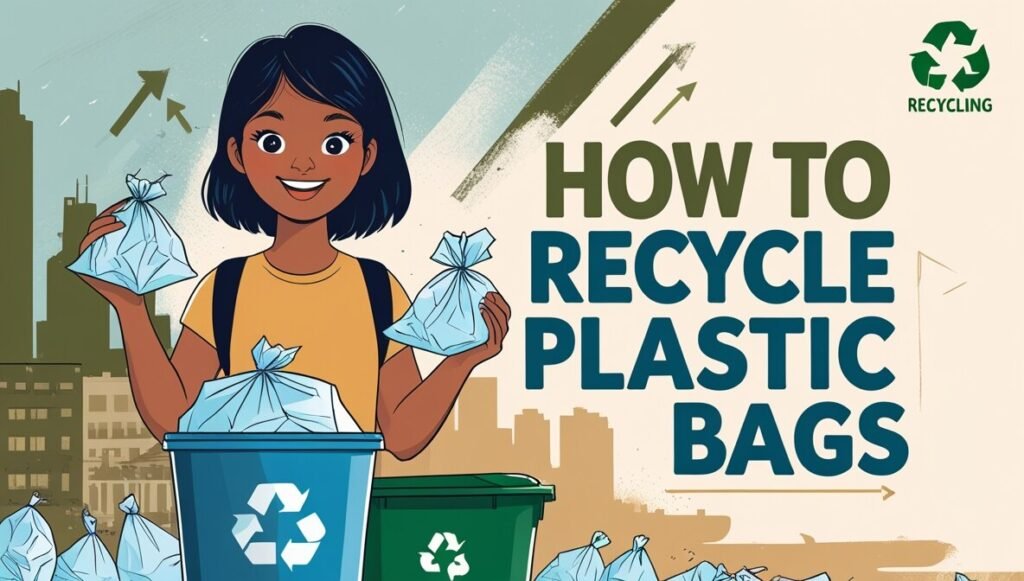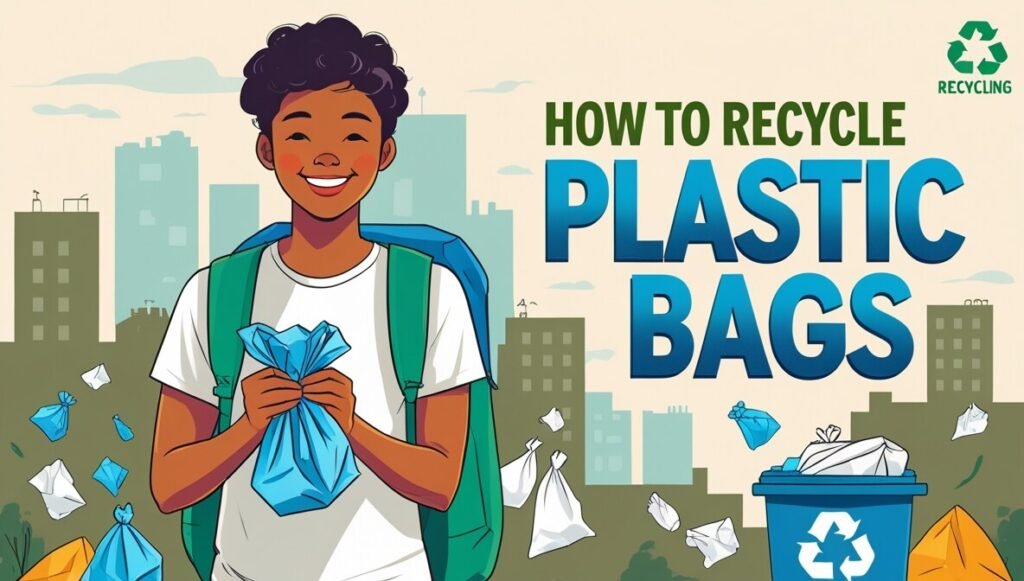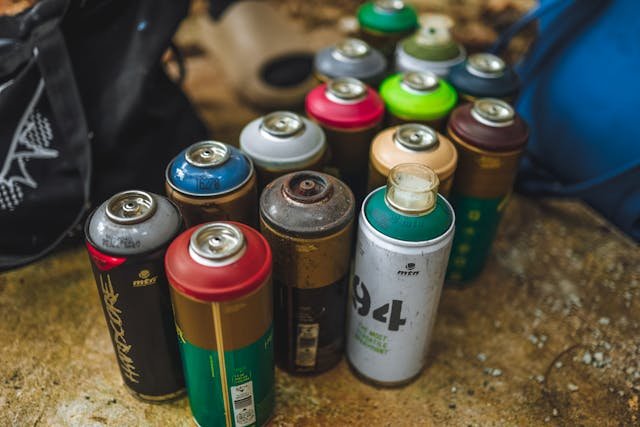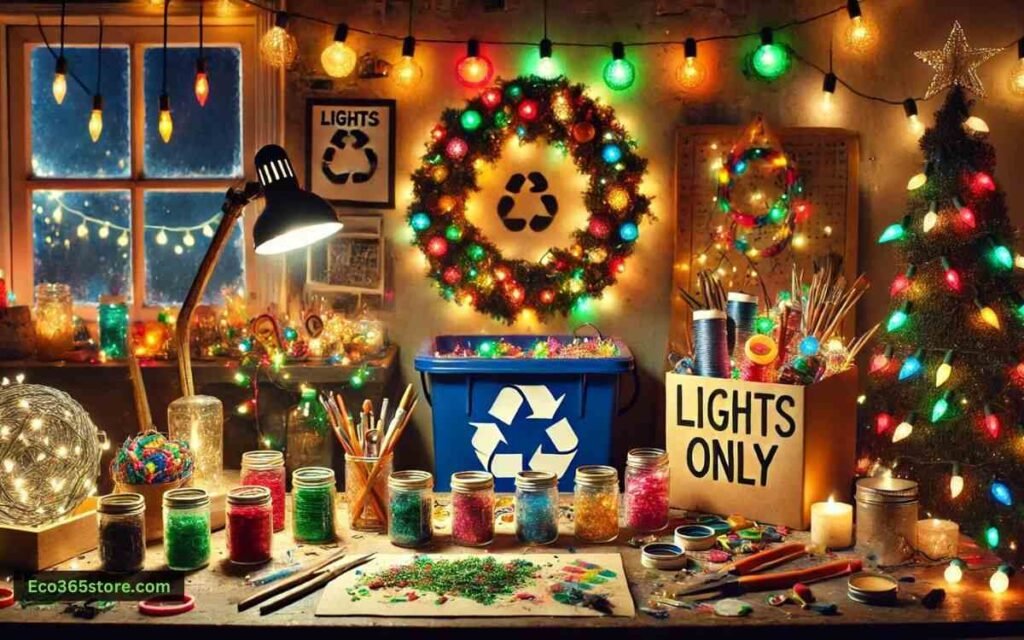Plastic bags are everywhere. They fill kitchen drawers, cling to fences, and too often, end up in landfills or floating in oceans. If you’ve wondered how to recycle plastic bags or felt frustrated by the lack of clear guidance, you’re not alone. Many of us assume plastic bag recycling is simple, only to discover it’s not as straightforward as tossing them into curbside bins. The good news? With a little know-how, you can help reduce plastic bag waste and recycle them properly.
This guide explains why plastic bags don’t belong in standard recycling bins, where you can recycle them instead, and how to do it right. Beyond that, we’ll explore ways to reduce your plastic footprint and answer frequently asked questions to help you make informed choices.

Why Can’t Plastic Bags Go in My Curbside Recycling Bin?
You might think recycling plastic bags in your curbside bin is fine, but here’s why it’s not:
- They Jam Machinery: Thin plastic bags and plastic film, like those used for bread bags or bubble wrap, are categorized as “tanglers.” When placed in curbside bins, they can snag and shut down sorting machines at recycling facilities.
- Contamination Issues: Food residue, moisture, or residue from items like pet food bags can contaminate other recyclables, spoiling entire batches.
- Special Materials: Plastic bags are often made of low-density polyethylene (LDPE), which requires specialized recycling processes that curbside systems don’t handle.
The issue isn’t that plastic bags aren’t recyclable; it’s that they need to be recycled in a specific way to avoid damaging recycling facilities or contaminating the system.
How to Recycle Plastic Bags: Your Go-To Locations
Grocery Stores & Retailers (Most Common!)
Some of the easiest and most accessible spots for recycling plastic bags are grocery stores and large retailers. Chains like Walmart, Target, Kroger, and Safeway often have dedicated collection bins near their entrances.
Before you drop off your plastic bags, check the store’s website for recycling policies. Many of these programs accept not only grocery bags but also bread bags, produce bags, and even air pillows from packages.
Tip: Next time you shop, bring your gathered bags along to drop them off before you head inside.
Local Recycling Centers & Transfer Stations
Some municipal recycling centers and transfer stations accept plastic film. It’s worth checking your city or county’s waste management website or giving your local recycling center a quick call.
Be sure to confirm what types of plastic film they accept. While some facilities welcome items like plastic wraps and paper towel case wraps, others may have stricter guidelines.
Special Events & Programs
Certain communities host events specifically designed for hard-to-recycle items, including frozen food bags and other plastic film. These events might occur a few times a year, often in partnership with local recycling services.
Pro Tip: Stay in the know by signing up for waste management newsletters or following relevant social media accounts where event details are shared.
Online Resources & Tools
If you’re unsure where to recycle plastic bags near you, online tools like PlasticFilmRecycling.org can help. This resource allows users in the U.S. to find the nearest drop-off location by entering their zip code. Similar tools are available globally.

What Types of Plastic Bags and Film Can Be Recycled?
Recycling plastic bags effectively requires understanding which items are acceptable and which aren’t.
Acceptable Items for Recycling
Ensure all items are clean and dry before dropping them off:
- Grocery bags
- Bread bags
- Dry cleaning bags
- Produce bags
- Plastic shipping envelopes (remove labels)
- Case wrap from items like paper towels, toilet paper, or bottled water
- Air pillows (deflated)
- Plastic food storage bags (rinsed and dried)
Unacceptable Items
These cannot be recycled due to mixed materials or contamination risks:
- Compostable or biodegradable plastic bags
- Snack bags (e.g., chip bags)
- Frozen food bags
- Pre-washed salad bags
- Crinkly cellophane (non-stretchy plastic film)
- Plastic sheeting and tarps
- Food-contaminated bags or wraps
When in doubt, avoid wishcycling (placing non-recyclable items in the bin, hoping they’ll be recycled). Stick to the acceptable list to avoid contamination.
How to Prepare Plastic Bags for Recycling (The Right Way)
Follow these steps to ensure your plastic bags are ready for recycling:
- Clean & Dry: Remove all food residue, liquids, and dirt. Bags must be completely dry.
- Remove Add-ons: Take out any receipts, labels, or twist ties.
- Bundle Loosely: Place smaller bags into one larger bag. This prevents loose items from blowing away or getting tangled in recycling equipment.
- Recycle Only Acceptable Items: Avoid placing any unapproved items in the bin to keep the recycling process smooth.
By following these steps, you’ll help reinforce recycling quality and ensure materials can be processed correctly.
Beyond Recycling: Reducing Your Plastic Bag Footprint
While recycling is vital, prevention is even more impactful. Here are some simple ways to cut down on plastic bag waste:
- Carry Reusable Bags: Invest in sturdy bags or foldable totes for everyday use.
- Switch to Reusable Produce Bags: Use mesh or cloth alternatives for fruits and vegetables.
- Opt for Less-Packaged Products: Whenever possible, choose items with minimal or no packaging.
- Support Plastic-Free Businesses: Shop at stores that prioritize eco-friendly packaging.
- Repurpose Plastic Bags: Use them for tasks like lining small trash bins or picking up pet waste.
By reducing your consumption, you’ll make a significant difference in lowering the demand for single-use plastics.
Final Thoughts
Recycling plastic bags can seem overwhelming, but it doesn’t have to be. By understanding what’s recyclable, where to take these items, and how to prepare them correctly, you can make a big impact. Couple this with reducing your plastic bag usage overall, and you’ll contribute to a healthier environment for everyone.
Next time you wonder what to do with that pile of plastic bags, you’ll have the tools and resources to handle them responsibly. Together, we can all play a part in reducing plastic waste.
Can I recycle compostable plastic bags?
No, compostable bags contaminate regular plastic recycling because they are designed to break down differently.
Do I need to wash plastic bags before recycling?
Yes, bags must be clean and free of food residue or moisture.
What happens to recycled plastic bags?
Recycled plastic bags are turned into products like composite lumber, plastic decking, and new bags.
Is plastic bag recycling really effective?
While not perfect, recycling plastic bags reduces their chance of ending up in landfills or polluting ecosystems. Combined with waste reduction, it’s an essential step toward sustainability.
Can I recycle plastic wrap from food?
Generally, yes—but only if it’s clean, dry, and stretchy (e.g., produce wrap). Avoid recycling cling wrap or wraps with food contamination.

Anamika is a passionate writer for Eco365Store.com, specializing in topics that inspire a cleaner, greener world. With expertise in home cleaning, recycling, and eco-friendly solutions, she crafts engaging and informative articles that help readers adopt sustainable practices in their daily lives.

